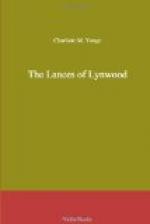The next morning Eustace, with Gaston, Arthur, and Ingram, all full of expectation, and delighted at the change from the gloomy solitary old Castle, were all posting on their way back to Bordeaux. They slept at an hostel about twelve miles from the town, first, however, by desire of the Prince’s messengers, sending Ingram on to announce their speedy arrival, and about ten in the morning rode into town.
There was evidently some grand spectacle at hand, for the Bordelais, gentle and simple, in holiday habits, were proceeding in the direction of the palace; but the Knight and his attendants had no time to wait for inquiries, and pressed on with the stream to the gates of the courtyard, where they found warders placed, to keep back the dense throng of people. At the mention of Sir Eustace’s name they readily and respectfully admitted him and his companions into the court.
“Ha!” cried Gaston, “what means this? is there a tilt towards? This reminds me of the good old days, ere the Prince fell ill. The lists, the galleries, the ladies, the Prince’s own chair of state, too! Oh, Sir Eustace, I could tear my hair that you cannot yet use your sword arm!”
“Can it be a challenge on the part of Fulk?” said Eustace, “or a reply to yours, Arthur? Yet that can hardly be. And see, there is no barrier in the midst, only a huge block. What can be intended?”
“I do not see Agnes among the ladies in the galleries,” said Arthur, looking up as eagerly, and more openly, than his uncle was doing. “And oh, here comes the Princess,—yes, and Lord Edward and little Lord Richard with her! And here is the Prince himself leaning on the Earl of Cambridge! Uncle Eustace, Lord Edward is beckoning to me! May I run to him?”
“Come with me, since I must present myself,” said Eustace, dismounting, as one of the Prince’s Squires held his horse.
“And, oh! who is yonder dark-browed dwarfish Knight at the Prince’s right hand?” cried Arthur.
Eustace could scarcely believe his eyes, as he looked where the boy pointed.
The royal party were now seated in full array on their raised platform; the Prince upon his chair of state, with more brightness in his eye and of vigour in his movements than when Eustace had last seen him; and at his side sat his wife,—her features still retaining the majestic beauty of Joan Plantagenet, the Fair Maid of Kent—but worn and faded with anxiety. She watched her princely Lord with an eye full of care, and could scarcely spare attention for the lovely child who clung to her side, and whose brilliantly fair complexion, wavy flaxen hair, high brow, and perfectly formed though infantine features, already promised that remarkable beauty which distinguished the countenance of Richard II. On the other side of the Prince sat his sister-in-law, the Countess of Cambridge, a Spanish Infanta; and her husband, Edmund, afterwards Duke of York, was beside the Princess of Wales. But more wonderful




